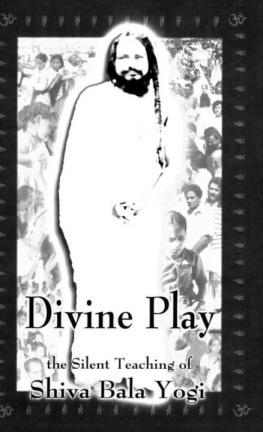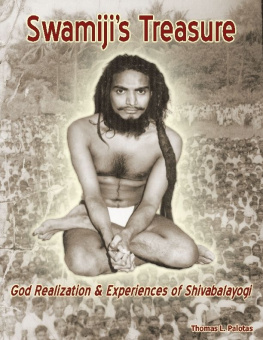
"Yogi is love."
Sanskrit and the modern Indian alphabets have no upper and lower cases, so quotes in those languages do not have capital letters.
Swamiji normally did not communicate in English, although he knew some phases and there were many occasions when it was apparent that language was no barrier to his understanding. Swamiji's own words, as translated by his interpreters or as recalled by devotees, are bold and italicized.
Many Western readers do not know the meaning or the context of Indian words, and in most cases, there are adequate English words so the reader need not be interrupted by turning to a glossary at the end of the book. However, there are some concepts for which we have no English words, and there are some Indian words that have become familiar. These words generally are not italicized and we list them below because the reader will find them frequently.

























.......................................................................................... I
................................................... 9
................................................. 19
.................................... 27
............................................ 45
................................................................ 48
............... 57
........................................................................ 67
................................................... 81
.................................................................................. 91
.......................................... 105
.................................................................... 107
..................................................................... 123
..................................... 128
................................................ 140
...................................... 165
.............................................................................. 189
......................................................................... 200
............................................. 202
................................................................... 225
................................................................. 243
......................................................... 259
.............................................................. 275
.................................................................................................... 283
....................................................... 286

Shivabalayogi autographing a copy of Tapas Shakti.
Shivabalayogi, directly or indirectly, through one incarnation or the other, blesses and guides the lives of innumerable souls, not only on this world, but on many worlds. In his lifetime as Shivabalayogi - an unusually public life in which he underwent particularly difficult spiritual penance for the sake of others - he gave no teaching other than to urge people to meditate and know the truth for themselves. Swamiji, as the great yogi referred to himself, wrote no book. The origins of the hook, Swamiji's encouragement for it, and things Swamiji said and did suggest that this is more Swamiji's hook than that of any literary author.
Earlier Books on Shivabalayogi
The first biography of Shivabalayogi was written in Swamiji's native language of Telugu by several people from the area around his village of Adivarapupeta, devotees close to the events of his youth and tapas. This booklet was translated into English by Professor S. K. Ramachandra Rao and published in 1968. Even earlier, shortly after Swamiji moved to Bangalore in 1963, Rumale Chennabasaiah wrote and published a short English booklet on Swamiji. Drafts of Rumale's writings were among the papers Swamiji made available in 1994. The recorded details of events around Swamiji's life indicate the first-hand authenticity of these early accounts, details which were confirmed during my 1996 interviews of many eyewitnesses.
















